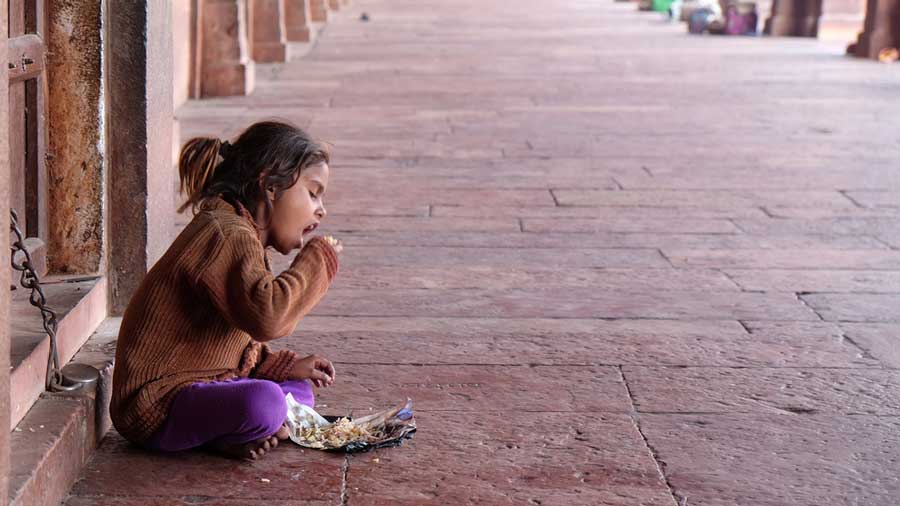This Vijaya Dashami, the prime minister, Narendra Modi, said his government aims to make India the strongest military power globally on its own strength. In the preceding weeks, two reports and data sets contrasted our masculine brouhaha with what might perhaps need priority over weaponizing India.
One, we slipped several notches — occupying 101st position on a list of 116 nations with sufficient data points — in the 2021 Global Hunger Index. Even Pakistan and Bangladesh are better off than India on the GHI.
While the report mentions we made significant if slow progress over the last two decades in reducing hunger and malnutrition, with a score of 27.5, hunger in India remains a serious concern, with a complex set of factors, including disruptions caused by the Covid-19 pandemic, at play.
Within this data set, children are hugely vulnerable. For instance, while child stunting decreased from 54.2 per cent in 1998-1999 to 34.7 per cent in 2016-2018, it is still very high. At 17.3 per cent, we have the highest child wasting rate of all countries covered in the GHI. This rate is slightly higher than it was in 1998-1999, when it was 17.1 per cent. These figures have implications.
As for the second report, Unesco released its State of the Education Report for India 2021: “No Teacher, No Class”, which bares the horrific reality of schooling, pedagogy and teachers, particularly in rural India. Over a lakh or nearly 7.5 per cent of all schools are single-teacher ones; 89 per cent of those are in rural India, and both pupils and teachers have pathetic conditions to sit through in these schools.
Therefore, even if we become a strong military power in, say, ten years, we shall also have large young populations that grew stunted and perhaps with minds that won’t comprehend life’s multiple challenges. This is because they remained malnourished and suffered because they went to school sans quality education.
In 2020 and 2021, schools worked virtually as Covid-19 hit us and have only now begun to open for physical classes. But across tribal areas, the residential ashram shalas saw huge dropouts. Tribal students have not only lost out on education but also on critical nutrition that is at the heart of the process. In Maharashtra, Karnataka, Telangana, Odisha, Madhya Pradesh and Chhattisgarh, stories abound of problems tribal children faced in accessing education, physically or through online means, in these two years.
As the GHI explains, the stunted growth and child wasting rates are a mix of many factors, including lack of access to healthcare, nutrition and education. Particularly in rural areas, they are intertwined.
At the core of ensuring nutrition, access to healthcare and education in villages is the grassroots teacher, the anganwadi worker or the accredited social health activist aka Asha, all of whom are not only contractual but also work in highly exploitative conditions. They earn meagre wages. The Unesco report rightly calls for improving teachers’ working conditions and building their capacities.
In 15 years, a third of the current teachers will need to be replaced, the Unesco report says. Today, teachers are in a deficit of over a million at the current student strength. There is an urgency to make big investments in these sectors, improve quality, accountability and governance.
The pandemic has driven home the important role teachers or Asha and anganwadi workers play in rural areas not just in imparting formal learning but also in ensuring that the children receive and eat at least one meal a day and in early healthcare. India might become a military powerhouse if the prime minister so desires, but our future won’t be secure if the next generations don’t grow healthy and wise.

